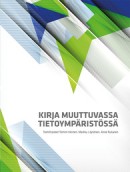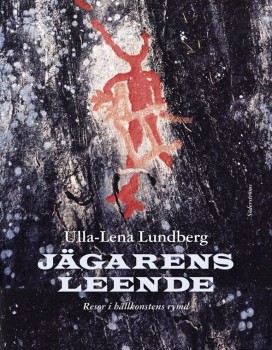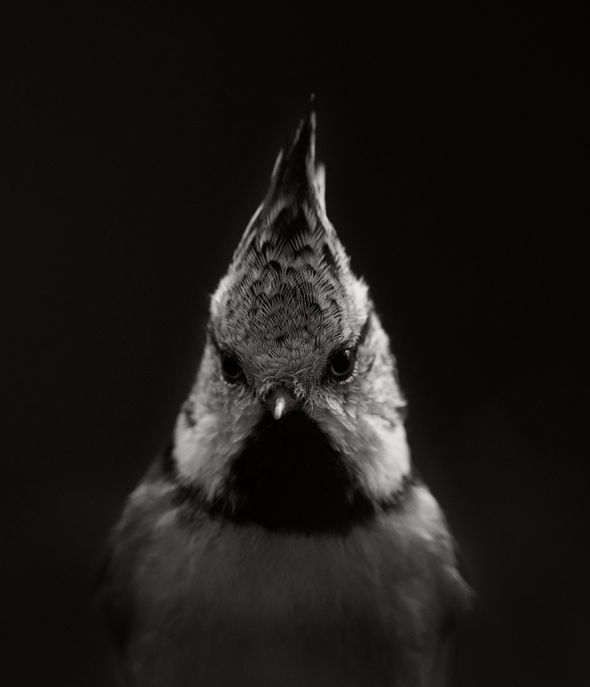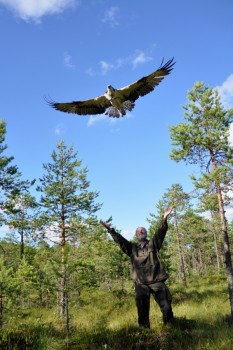Search results for "sofi oksanen/feed/www.booksfromfinland.fi/2012/04/tuomas-kyro-mielensapahoittaja-ja-ruskea-kastike-taking-offence-brown-sauce"
Kirja muuttuvassa tietoympäristössä [The book in a changing information environment]
21 August 2014 | Mini reviews, Reviews
 Toim. [Ed. by] Markku Löytönen, Tommi Inkinen, Anne Rutanen
Toim. [Ed. by] Markku Löytönen, Tommi Inkinen, Anne Rutanen
Helsinki: Suomen tietokirjailijat ry. [The Finnish Association of Non-Fiction Writers], 195 p., ill.
ISBN 978-952-67356-3-4
paperback; available also online:
http://www.suomentietokirjailijat.fi/jasenyys/julkaisut/kirja-muuttuvassa-tietoymparisto/
In the Western world the experience of reading is undergoing a critical change. There is even talk of a third information revolution. Books are increasingly acquiring electronic form, and the future of the printed book is being called into question. Kirja muuttuvassa tietoympäristössä contains the considered opinions of 18 experts on what is taking place in the field of non-fiction, and gives an overview of the literature on the current situation, which is seen from the point of view of the bookstore, the library, the author and the publisher. There is a discussion of intellectual property issues, developments in technology, and changes in the use of teaching materials, language, and reading habits. Finland is a leading country in both literacy and reading. The number of books has slowly declined in recent years, but it seems that the country’s youth has maintained an interest in books, and in fiction in particular. Although printed reference works of the encyclopedia type have given way to the information provided by the Internet, it is likely that literature and reading will preserve their status as a part of human culture.
Translated by David McDuff
Stories in the stone
2 December 2010 | Extracts, Non-fiction
Extracts from Jägarens leende. Resor in hällkonstens rymd (‘Smile of the hunter. Travels in the space of rock art’, Söderströms, 2010)
 ‘Why do some people choose to expend what is often a great deal of effort hammering images in the bedrock itself, while others conjure up, in the blink of an eye, brilliantly radiant pictures on a rock-face that was empty yesterday but is now peopled by mythological animals, spirits and shamans?
‘Why do some people choose to expend what is often a great deal of effort hammering images in the bedrock itself, while others conjure up, in the blink of an eye, brilliantly radiant pictures on a rock-face that was empty yesterday but is now peopled by mythological animals, spirits and shamans?
‘I think about this often – I who love painting but who still chose a career that involves me sitting and hammering away, day in and day out, like a true rock-carver,’ writes author and ethnologist Ulla-Lena Lundberg in her new book on the art of the primeval man
When the children of Israel went into Babylonian captivity, hanging up their harps on the willow-trees and weeping as they remembered Zion, my sister and I were already sitting by the rivers of Babylon. We knew how they felt. Our father was dead and we had been sent away from our home. We sat there clinging to each other, or rather I was the one clinging to Gunilla, and she had to try to rouse herself and find something for us to do, to give us something else to think about. More…
Art or politics?
16 February 2012 | This 'n' that
You’re going about your business in Helsinki Railway Station on a cold winter’s day — waiting for your train, buying tickets or newspapers or just taking short-cut through the building to keep warm – when suddenly the bloke next to you bursts into song. And not just him: along with a couple of dozen others, he makes the air ring with the patriotic song Finlandia, sung in harmony and perfectly in tune. (The video can be viewed at http://www.youtube.com/watch?v=wO63xt2jWtc) More…
Money makes the world go round
31 August 2012 | Fiction, Prose
Extracts from the novel Mr. Smith (WSOY, 2012). Introduction by Tuomas Juntunen
I have a confession to make.
I couldn’t have lived on my salary. Most people would solve this by taking out a loan, living on credit. I’ve never lived in debt. Instead I’ve had to make my modest capital grow by investing it – through the company, of course, because irrespective of their colour governments generally understand companies better than small investors. You have to make money somewhere other than the Social Security Office.
Work doesn’t make money; money makes money.
You have to let money do the work.
This is nothing short of a profound human tragedy: most people are forced to waste the majority of their lives, to use it in the service of complete strangers, for unknown purposes, doing something for money that they would never do if they didn’t have to. The most shocking thing is that people actively seek out this state of affairs, strive towards it; it is a goal towards which society lends us its full support, no less.
Such wage slavery is called ‘work’. More…
Notes related to pharmacist Pemberton’s holy nectar
Extracts from the novel Vådan av att vara Skrake (‘The perils of being Skrake’, Söderström & Co.; Isän nimeen, Otava, 2000)
At the time of Werner’s stay in Cleveland Bruno and Maggie had already been divorced for some years, and in an irreconcilable manner. But they were still interested in their grown-up son, each in their own way; Maggie wrote often, and Werner replied, he wrote at length, and truthfully, for he knew that Bruno and Maggie no longer communicated; to Maggie he could admit that he hated corporate law and bookkeeping, and to her he dared to talk about the raw music he had found on the radio station WJW, he wrote to her that the music of the blacks had body and that he had found a great record store, it was called Rendezvous and was situated on Prospect Avenue and there he had also bought a ticket for a blues concert, wrote Werner, he thought that Maggie would understand. More…
1968
30 March 2005 | Fiction, Prose
A short story from Lugna favoriter (‘Quiet favourites’, Söderströms, 2004)
We were in the space age, the age that came and went, the age of space and great dreams, when space was what we talked about and space was what the papers wrote about, and about Vietnam and protests and revolution, in articles precocious and prematurely old children spelled their way through, children living in the mixed forests of the North which had recently been transformed into gleaming suburbs where ink-caps, puffballs and parasol mushrooms still grow in the backyards of high-rise tower blocks. It says in the paper that we humans will soon have to move away, leave the Earth because our planet has become overcrowded and almost uninhabitable, and space and the eternity of space are waiting for us and we have engineers of the highest class who will soon solve such small problems as still remain. It’s not a question of forests of mixed trees or ink-caps or parasol mushrooms or other earthly things, it’s a question of it being too late now, that we must go further, first to the moon and then to Mars and Andromeda and further still, and here are some of the key words and phrases: space programme, space race, Apollo, Vostok, Tereshkova and Glenn. For humanity has dreams, dark mixed visions and a nagging and not easily extinguished sense of life’s inscrutability and greatness, but down here all goes on as before, we kill each other, we kill our fellow men in jungles and marshes, we kill them amid rugged mountains and in snow-clad forests, we poison them and blow them to pieces, we kill them in dark backstreets and in ramshackle wooden hovels and in mighty marble palaces where the bath-taps glitter with gold. Only a chosen few are able to escape, and to do this they have to set off upwards into a coolness, and seek out a darkness and solitude where there will be no anxiety or feelings of guilt. But before they can get there they must face opposition of a magnitude that can only be overcome by a fierce rush of power, and before the rocket can start it sits and breathes out smoke and gases and fire for a good thirty seconds before lifting off slowly and reluctantly as if unwilling to leave its home planet, as if it hasn’t the slightest desire to go, but when it gets under way it travels at incomprehensible speeds over unimaginable distances, it’s only 108 years since Lenoir invented the internal combustion engine and we are already up in space where it’s silent and cool and peaceful, just a little anxiety in case some instrument fails, in case some double safeguard shows itself insufficient, otherwise nothing, just weightlessness and silence, just the oceans and deserts and mountain-chains on the surface of our blue globe. Though let’s be fair: the Chinese, who haven’t been up in space, claim that the Great Wall of China must be visible from up there, but on the other hand they have nothing to say about the visibility of new-built suburbs in the miserable little capitals of small underpopulated countries with frosty climates. More…
Under cover
29 March 2012 | Extracts, Non-fiction

Soul-bird: crested tit. Photo: Heikki Willamo
The photographer and writer Heikki Willamo lived for a year in the forest – not full-time, but for long periods in all seasons, sleeping in his lean-to. This two-hundred, preserved hectare fragment lies in the midst of felled clearings, farmed forest and habitation in southern Finland.
Many Finns still say that being in a forest is a peaceful and empowering experience; Willamo recorded his thoughts on this as well as his black-and-white photographs in his book, Vuosi metsässä (‘A year in the forest’, Maahenki, 2012. See also extracts from Viimeiset vieraat [‘The last visitors’] here) More…
Animal crackers
30 June 2004 | Children's books, Fiction
Fables from the children’s book Gepardi katsoo peiliin (‘A cheetah looks into the mirror’, Tammi, 2003). Illustrations by Kirsi Neuvonen
Rhinoceros
 The rhinoceros was late. She went blundering along a green tunnel she’d thrashed through the jungle. On her way, she plucked a leaf or two between her lips and could herself hear the thundering of her own feet. Snakes’ tails flashed away from the branches and apes bounded out of the rhino’s path, screaming. The rhino had booked an afternoon appointment and the sun had already passed the zenith.
The rhinoceros was late. She went blundering along a green tunnel she’d thrashed through the jungle. On her way, she plucked a leaf or two between her lips and could herself hear the thundering of her own feet. Snakes’ tails flashed away from the branches and apes bounded out of the rhino’s path, screaming. The rhino had booked an afternoon appointment and the sun had already passed the zenith.
When the rhinoceros finally arrived at the beautician’s, the cosmetologist had already prepared her mud bath. The rhino was able to throw herself straight in, and mud went splattering all round the wide hollow. More…
The honey of the bee
30 June 2005 | Archives online, Fiction, Prose
A short story from the collection Mitä sähkö on (‘What electricity is’ WSOY, 2004). Introduction by Jarmo Papinniemi
Five days before I was born my grandfather reached sixty-six. He’d always been old. The first image I have of him gleams like a knife on sunny spring-time snow: he was pulling me on my sledge over hard frost under a bright glaring-blue sky. In the Winter War a squadron of bombers had flown through the same blue sky on their way to Vaasa; the boys leapt into the ditches for cover, as if the enemy planes could be bothered to waste their bombs on a couple of kids. Be bothered? Wrong: kids were always the most important targets.
Now it’s summer, August, and I’m sitting on the grassy, mossy face of the earth, which is slowly warming in a sun that’s accumulated a leaden shadiness. I’m sitting on my grandfather’s land. It’s the time when the drying machines buzz. Even with eyes shut, you can sense the corn dust glittering in the sun. Even with eyes shut, you can take in the smell of the barn’s old wood, the sticky fragrance of the blackcurrants barrelled on its floor, the tins of coffee and the china dishes on the shelves, and the empty grain bins; there’s the cupboard Kalle made, with its board sides and veneered door, and the dust-covered trunk that was going to accompany my grandfather to another continent. The ticket was already hooked, but Grandfather’s world remained here for good. When Easter comes we’ll gather the useless junk out into the yard and burn it; Grandfather’s travel chest will rise skywards. Grandfather stands in the barn entrance, leaning on the doorpost. He’s dead. Over all lies a heavy overbearing sun. Beyond the field the river’s flowing silently in its deep channel. At night time its dark and warm. More…
That remarkable man
31 December 1988 | Archives online, Fiction, poetry
Poems by Lauri Viita. Introduction by Kai Laitinen
Alfhild
Mothers alone, endowed
with hope, see God.
They’re given strength and given will,
to climb in dream from under the cloud,
and look from a higher hill.
Alfhild, she who gave me birth,
nightly sailed away from earth
to where her Eemeli growled his say,
coming and going, as he did in his day.
Now they walk
the bright star track,
father and mother, looking back
at the little hill and the family home,
the cats, the dogs, the people they’ve known,
waving and calling as best they can
lest any of us trip on Pispala’s stone.
On a distant planet on a garden swing
under a rowan they linger and cling
and silently remember their light and dark
as a courting couple in Tampere Park –
and if it was payday, the extra fun
of tucking away a coffee and bun. More…
Mother-loves
31 March 1994 | Archives online, Fiction, Prose
Extracts from the novel Ihon aika (‘The time of the skin’, WSOY, 1993). Introduction by Suvi Ahola
In the hospital they stare at us, enquiringly, as if we are abandoning her. They look in turn at our mother’s half-conscious, ulcerous body, at the nurse who, curling her lip, cuts mother’s knickers, housecoat and apron off her, at us, the exhausted ones, who are now only at the beginning of our real work. They fill in their forms and ask their official questions; they do not know how anguished and relieved we shall be in a moment when we may leave our mother to them, that ironically smiling, wounded woman who is still, with her last strength, attempting to kick the nurse who is pouring warm water on her bloody feet.
I gaze at mother’s battered body with something like greed; I feel the same kind of curiosity toward this shocking sight as when I was four and we were in the bathroom together. I was shy, I tried to spy on mother’s fleshy body, her luxuriantly curving skin, through the mirror, but I was always left with the feeling that I had seen too little, I had been able to understand only a small part of what my eyes had registered. More…
A life at the front
30 September 2001 | Archives online, Fiction, Prose
Extracts from the novel Marsipansoldaten (‘The marzipan soldier’, Söderström & Co., 2001). Introduction by Maria Antas
[Autumn 1939]
Göran goes off to the war as a volunteer and gives the Russians one on the jaw. Well, then. First there is training, of course.
Riihimäki town. Recruit Göran Kummel billeted with 145 others in Southern elementary school. 29 men in his dormitory. A good tiled stove, tolerably warm. Tea with bread and butter for breakfast, substantial lunch with potatoes and pork gravy or porridge and milk, soup with crispbread for dinner. After three days Göran still has more or less all his things in his possession. And it is nice to be able to strut up and down in the Civil Guard tunic and warm cloak and military boots while many others are still trudging about in the things they marched in wearing. The truly privileged ones are probably attired in military fur-lined overcoats and fur caps from home, but the majority go about in civilian shirts and jackets and trousers, the most unfortunate in the same blue fine-cut suits in which they arrived, trusting that they would soon be changing into uniform. More…
Looking back on a dark winter
31 December 1989 | Archives online, Fiction, Prose
Extracts from the autobiographical novel Talvisodan aika (‘The time of the Winter War’), the childhood memoirs of Eeva Kilpi. During the winter of 1939–40 she was an 11-year old-schoolgirl in Karelia when it was ceded to the Soviet Union and the population evacuated
Time is the most valuable thing
we can give each other
War’s coming.
One day my father comes out with the familiar words in a totally unfamiliar way, while we’re sitting round the kitchen table eating, or just starting to eat.
He says to mother, as if we simply aren’t there, as if we don’t need to bother, or as if listening means not understanding. Or perhaps they’ve simply no other chance to speak to each other, as father’s always got to be off hunting, or on his way to the station, and mother’s always cooking. More…
The lady who could fly
30 June 1989 | Archives online, Fiction, Prose
A short story from Kenkää suurempi jalka (‘The foot bigger than the shoe’, 1992)
A day came when she felt she could fly. You used technological gear and gadgets for flying, or meteorological shifts in the air masses: rising currents gave you a weightless ecstasy with the lightest of equipment. But that wasn’t it.
To begin with it was one of those typical flying dreams, which gradually extended into the waking state: she could feel it coming in her sinews, her nervous system, her cortex. She was acquainted with Freud and Jung and the other dream-interpreters of today. Characters in the myths and fairytales flew; cruel princesses flew on the wings of the storm; Gogol’s overcoats, Chagall’s lovers, cows and cats flew; and vampires – those last leather-winged flutterings of the prehistoric archaeopterix in the mud of the gene pool. More…
Winging it
6 June 2013 | This 'n' that

From Finland to Africa: Ilmari takes off in 2012. Photo: Juhani Koivu
Ilmari is back!
Last October we brought you the story of a winged traveller who left his home in southern Finland for Africa. Ilmari is a nine-year old osprey who spent his winter in Cameroon; as he and his family are fish-eaters, they have to foresake their frozen homeland for about five months of the year.
It’s a long way to Cameroon, around 6,500 kilometres, and the return trip is a dangerous one. But Ilmari made it: his satellite transmitter reported that he returned to his native landscape on 21 April, after flying 7,351 kilometres, which took him 23 days – an average of 320 kilometres per day. He took a couple of days off on Crete and in Serbia.
Now satellite transmitters and live cameras reveal all the intimate secrets of birds of prey (and bears, hibernating in their lairs). On this British site osprey Lizzie babysits as her chicks flap their tiny wings in early June.
Now it’s time for Ilmari to concentrate on fishing, hopefully in order to feed his offspring – until October, when he will take to the skies again.
